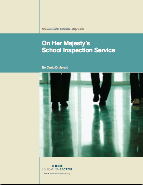 As the tide of education accountability ebbs from federal
shores and rolls back out to state seas, states are in a position to reboot,
retool, and reimagine their current accountability models. This Education
Sector paper from independent analyst Craig Jerald offers a novel suggestion:
Model new accountability systems after the Brits’s long-running
school-inspection program. The specifics of the program have been tinkered with
since its inception, but its tenets remain the same. School ratings (given on a
five-point scale) are based upon site-visit reports by trained professionals
using a multi-dimensional metric. (Next year, those measures will be: student
achievement, quality of teaching, students’ behavior and health, and leadership
and management of the school.) Schools are told—explicitly—what they’re doing
right and wrong, and are given tangible recommendations for improvement. And
transparency is key—with all school evaluations made public online within
fifteen days of site visit. Jerald is right to call for a more robust, and
accessible, accountability system. And this British model (implemented in a
union-friendly nation) is worth states’ consideration. But there’s still one
anchor holding back large-scale adoption in the U.S.: Britain no longer has the
powerful local school boards seen in the U.S.—entities that (along with other
systemic issues) tie the hands of school leaders who might want to implement
thoughtful improvement recommendations.
As the tide of education accountability ebbs from federal
shores and rolls back out to state seas, states are in a position to reboot,
retool, and reimagine their current accountability models. This Education
Sector paper from independent analyst Craig Jerald offers a novel suggestion:
Model new accountability systems after the Brits’s long-running
school-inspection program. The specifics of the program have been tinkered with
since its inception, but its tenets remain the same. School ratings (given on a
five-point scale) are based upon site-visit reports by trained professionals
using a multi-dimensional metric. (Next year, those measures will be: student
achievement, quality of teaching, students’ behavior and health, and leadership
and management of the school.) Schools are told—explicitly—what they’re doing
right and wrong, and are given tangible recommendations for improvement. And
transparency is key—with all school evaluations made public online within
fifteen days of site visit. Jerald is right to call for a more robust, and
accessible, accountability system. And this British model (implemented in a
union-friendly nation) is worth states’ consideration. But there’s still one
anchor holding back large-scale adoption in the U.S.: Britain no longer has the
powerful local school boards seen in the U.S.—entities that (along with other
systemic issues) tie the hands of school leaders who might want to implement
thoughtful improvement recommendations.
Craig D. Jerald, On Her Majesty’s School Inspection Service (Washington, D.C.: Education Sector, January 2012).
